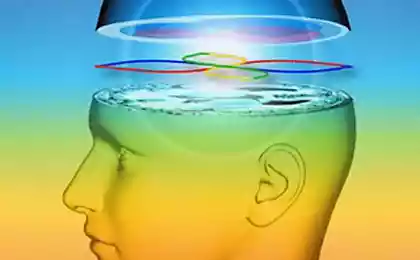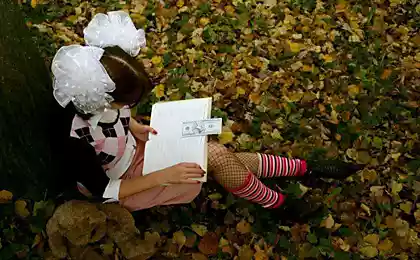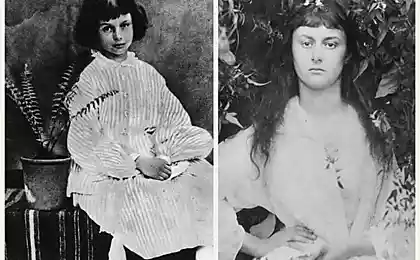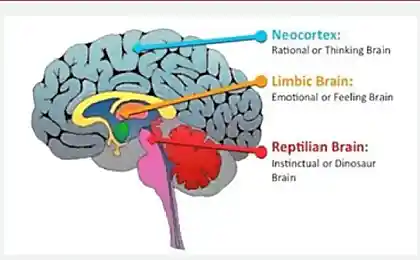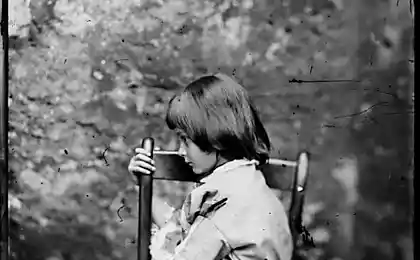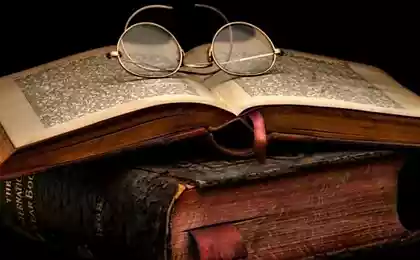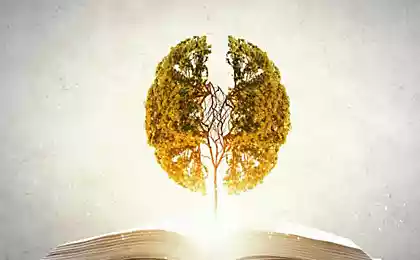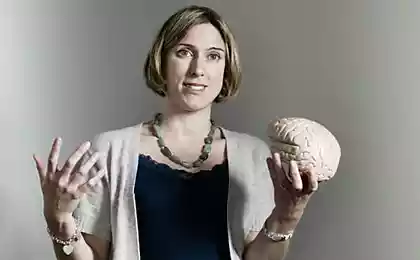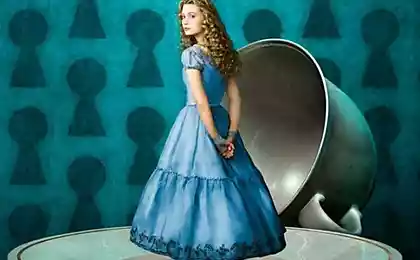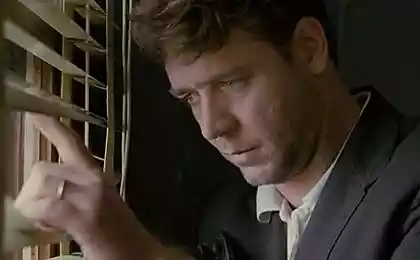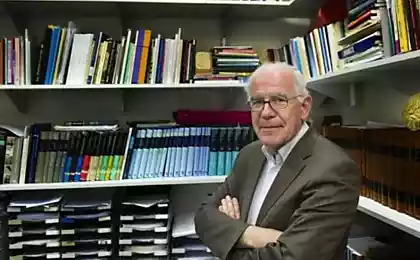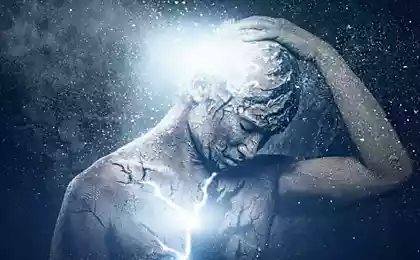1049
5 of these wonders of the brain, described in the book "Alice in Wonderland"
Children's book with a grown-up soderzhaniemV popular tales of Lewis Carroll has hidden the truth about the human brain, which to this day inspire neurologists. David Robson also decided to jump into the rabbit hole.
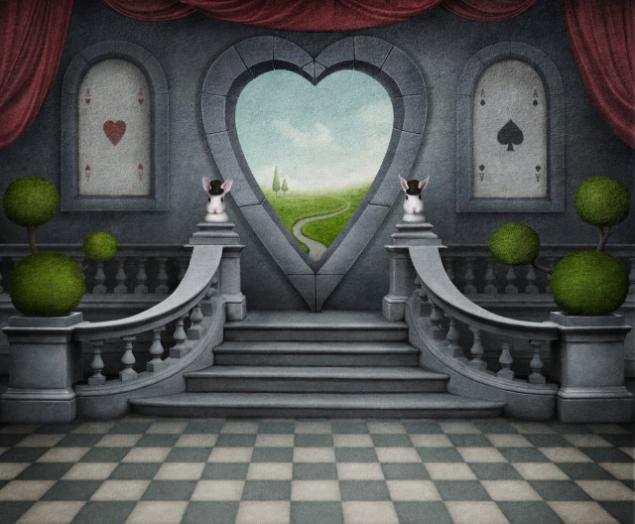
Lewis Carroll surprisingly restrained spoke about his masterpiece.
Long before we had the technology to display a wonderland of our brain, Carroll has already outlined the contours of the country with the help of his comic thought experiments h4> «heroine just an hour is in the dungeon encounters there are different speakers birds, animals and so on (there are no fairies). All this is just a dream, but I do not want it to be disclosed until the end, "- he wrote in the humorous magazine Punch.
«Around the middle of two-thousand years, neuroscientists have begun to realize that memory is actually not related to the past. Its purpose - to help us to properly act in the future » h4> One way to do this is as follows: we imagine the future by sharing our memories, and then assemble them in such a way that there was a single new script. < br />
Stories taking place in the country, absurd world, does not justify our expectations, they thereby make the brain more flexible and faster h4> It is better to understand the hypothetical, and they definitely have a tendency to develop more advanced "theory of mind", which gives them a deeper understanding of the motives and intentions of others.

Lewis Carroll surprisingly restrained spoke about his masterpiece.
Long before we had the technology to display a wonderland of our brain, Carroll has already outlined the contours of the country with the help of his comic thought experiments h4> «heroine just an hour is in the dungeon encounters there are different speakers birds, animals and so on (there are no fairies). All this is just a dream, but I do not want it to be disclosed until the end, "- he wrote in the humorous magazine Punch.
To date, a modest tale Carroll formed the basis for many films, paintings, and even ballets.
But few know that the book reflects the ways in which the brain forms a representation of reality. Memory, language and consciousness ... Long before we had the technology to show the wonders of our country's brain, Carroll has already outlined the contours of the country with the help of his comic thought experiments.
Each of us can learn something new about yourself from "Alice in Wonderland", but for this it is necessary to know where to look.
"Drink me," Okay, I'll eat it, - said Alice - and if he will allow me to grow up, I can reach the key; and if he will make me smaller, I can creep under the door; Anyway, I'll get into the garden and do not care what happens!
In his first adventure, Alice finds a vial labeled "Drink Me" label, which reduces it to 10 inches. The effect of magic pie opposite - it has become so large that put her head on the ceiling. These scenes - the most memorable, like a book, and subsequent film adaptations of Disney. And yet these scenes have attracted attention of scientists.
In 1995, a psychiatrist named John Todd discovered that some of his patients reported similar feelings, "opens up like a telescope».
The disorder, known as the "syndrome of Alice in Wonderland," is most common in children.
"I heard children say that things seem to them turned upside down, and even if their mother is at the other end of the room, it seemed that she was there" - says Grant Lew, a neurologist from the University of Pennsylvania in Philadelphia, who has studied this phenomenon .
Carroll's Diaries showed that he was suffering from a migraine, which can cause this syndrome. So some people think that while writing the book, he was inspired by his own experience. Liu believes that the syndrome may be associated with abnormal activity of the parietal lobes of the brain, which is just responsible for spatial perception and sense of distance and prospects.
But, despite the fact that all this looks scary, all these illusions are generally harmless.
"Most of the false sense of security, and we thus obtain a guarantee that our patient is not crazy, because other people are also experiencing similar things," - said Liu.
Today neuroscientists are trying to cause similar illusions in healthy people. This, they believe, may shed light on how we create our sense of what is happening here and now.
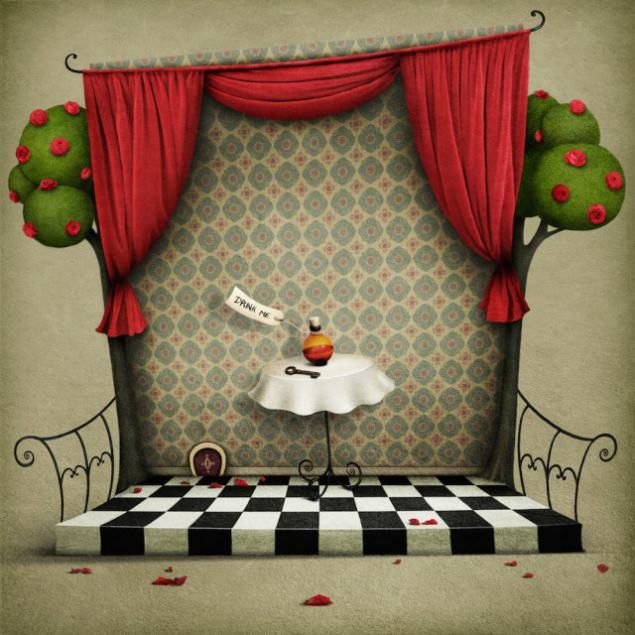
The Duchess and the Cheshire Kotva This time there could be no mistake: it was a pig, no less, and she felt that it is quite absurd - to continue to keep it.
In Wonderland mass character of the bizarre appearance, is there and grotesque Duchess with her crying baby. As soon as Alice takes him in her arms, the child's nose is lifted up his eyes shifted to the nose, and then he begins to grunt. And before Alice realized what was happening, the baby finally turned into a pig.
Elsewhere in the book Alice plays croquet using a flamingo as a club and met a smiling Cheshire Cat smile which remains even after a cat disappears.
The dreams are often found objects that turn into other objects, and this process is nothing more than a dream of our mind, which is very accurately shown in the adventures of Alice.
Neuroscientists believe that the above phenomenon - an attempt to combine the sleeping brain memories.
To make the memory stronger, the brain builds a connection between the events and creates great stories of our lives. Thus, the memories of a pig, for example, can be crossed with the memories of a child, and then it all merges into one surreal effect on the background of fantastic landscape.
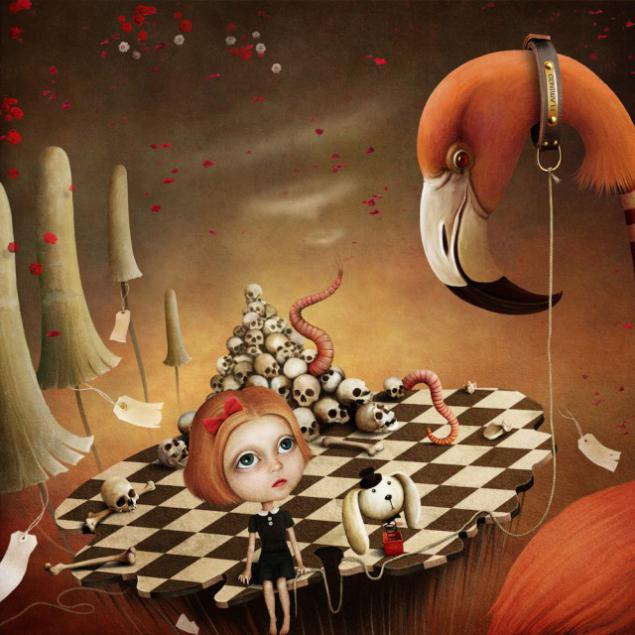
Humpty Dumpty and Barmaglot- My name is Alice, but ...
- That's a pretty stupid name - impatiently Humpty Dumpty - what does it mean?
- And whether the name mean something? - Alice asked doubtfully.
- Of course, should be - said Humpty Dumpty, grinning, - my name is my form and that this form is good and beautiful. And with a name like yours you can be almost any shape.
The adventures of Alice in Wonderland, these investigations continue, including where there are a few humorous attack on the nature of the speech.
It begins in the first chapter when Alice reads a poem called "Jabberwocky." "Varkala. Hlivkie shorki / pyryalis of Naveh ... "- so begins the poem.
"I think it is very beautiful, - says Alice finished reading - but it is quite difficult to understand!" And Alice hits the nail: poem lightly tickle our sense of grammatical correctness, but the words themselves in it - just rubbish.
Neuroscientists who study the mechanics of speech, now regularly use so-called "supply Jabberwocky" in brain scans to show that in the process of meaning and grammar are responsible for the processing of very different areas of the brain.
And then Alice meets Humpty Dumpty, and their conversation explores the nature of words themselves.
Can a two-word phrase, which, according to Humpty Dumpty, shows his "beautiful view", to be better than a number of some other random sounds?
This is a very ancient philosophical question which has arisen in the days of Plato. Previously, experts believed that it was impossible, because the words are quite arbitrary, and sounds can be no "innate" sense. Today, however, it seems that Humpty Dumpty was right.
Take the word "kicks" and "Buba". If people put the task to associate these words with some items, most people will choose "Kiki" to indicate sharp objects as "bubu" to refer to objects of round shape. This "sound symbolism" is now a popular area of research, although its cause is never fully clear. There is another theory which states that the above association arise from the forms that form the lips when pronouncing these words.
Whatever it was, it means that sometimes you can with high probability to guess the value of foreign words. And yet it can affect the nicknames that give people that nickname, in the case of Humpty Dumpty, reflecting appearance.
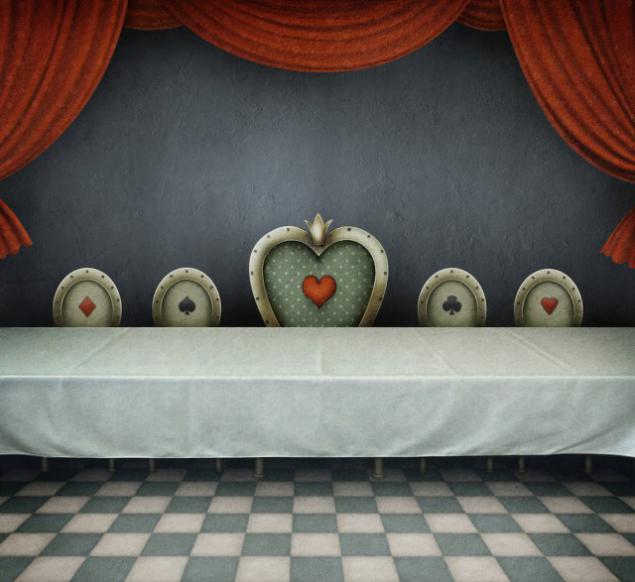
White Queen and mental journey through time- it is unimportant memory, it only works in the opposite direction, - said the Queen.
- What do you remember best? - Alice ventured to ask.
- What happened two weeks - casually replied the Queen.
Later, during his travels Alice led long conversations with the White Queen. This queen - the most mysterious creatures of Carroll, she claimed that she has a strange gift of foresight. And her comments about memory were prophetic.
"Around the middle of two-thousand years, neuroscientists have begun to realize that memory is actually not related to the past. Its purpose - to help us to properly act in the future ", - says Eleanor Maguire of University College London, who often uses the White Queen to illustrate his idea:" You have to project yourself into the future to determine the best plan of action ».
«Around the middle of two-thousand years, neuroscientists have begun to realize that memory is actually not related to the past. Its purpose - to help us to properly act in the future » h4> One way to do this is as follows: we imagine the future by sharing our memories, and then assemble them in such a way that there was a single new script. < br />
Thus, memory and foresight are using the same "mental time travel" in the same area of the brain. Maguire, for example, has studied people with a damaged hippocampus. Such damage means that people are not able to remember his past, but the more she found that such people are very short-sighted.
"We asked them to imagine that they will meet each other next weekend, and they just could not do it," - she says. Roughly the same thing happened when they were asked to imagine a future visit to the coast: "They knew that there would be sand and sea, but before their mind's eye pictures Coast simply does not arise».
In other words, these people, as opposed to the White Queen, forever stuck in the present.
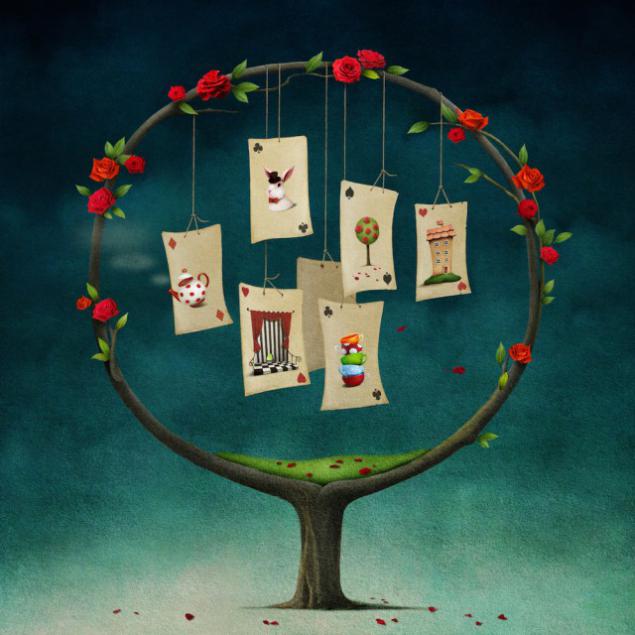
Can you think of impossible things? - There is no point in trying, - said Alice - You can not believe impossible things.
- I dare say you have just had a little practice, - said the Queen. - When I was your age, I always did it, for half an hour a day. And sometimes, before breakfast, I once believed in six impossible things.
Continuing his studies of the human imagination, the Queen praises the dignity of thinking of the impossible.
We talked with Alison Gopnik from the University of California, which read "Alice" when she was three years old, and now with its help, trying to understand how our imagination.
It is, for example, found that children who play and pretend, thus practicing "faith in the impossible", subsequently develop excellent cognitive abilities.
Stories taking place in the country, absurd world, does not justify our expectations, they thereby make the brain more flexible and faster h4> It is better to understand the hypothetical, and they definitely have a tendency to develop more advanced "theory of mind", which gives them a deeper understanding of the motives and intentions of others.
"Much of what they do, pretending to be in the game - is, in fact, hypotheses and bringing this hypothesis to its logical conclusion. Interestingly, Carroll also did something similar, he can see the same ability to take some kind of background and lead her to the insane conclusion ", - she says.
Alice's adventures are full of all sorts of surreal encounters. Travis Proulx from Tilburg University in the Netherlands studied the way in which the surreal and absurdist literature, like the works of Carroll, affects our consciousness.
He found that if the stories that take place in a strange, absurd world, does not justify our expectations, they thereby make the brain more flexible and faster. We increased creative ability, and we will accept new ideas.
Thus, if you need something to spur your mind, the best solution for this could be an evening with "Alice».
"I have no doubt that it stimulates mental conditions that increase cognitive abilities, and they force us to create new relationships," - says Proulx.
Alison Gopnik notes that some hallucinogens can also help you get to the realm of free association, but the reading is definitely a safer way to turn back the clock and look at the world from a different angle.
Carroll writes: "Recently, there was so many strange things that Alice was beginning to think that very few things are really impossible».
His readers, of course, agree with this.
via www.bbc.com/future/story/20150225-secrets-of-alice-in-wonderland
Dogs - the most sarcastic creatures in the animal kingdom, and 3 more curious fact
Focuses of the subconscious that we are aware of many things without even realizing it








